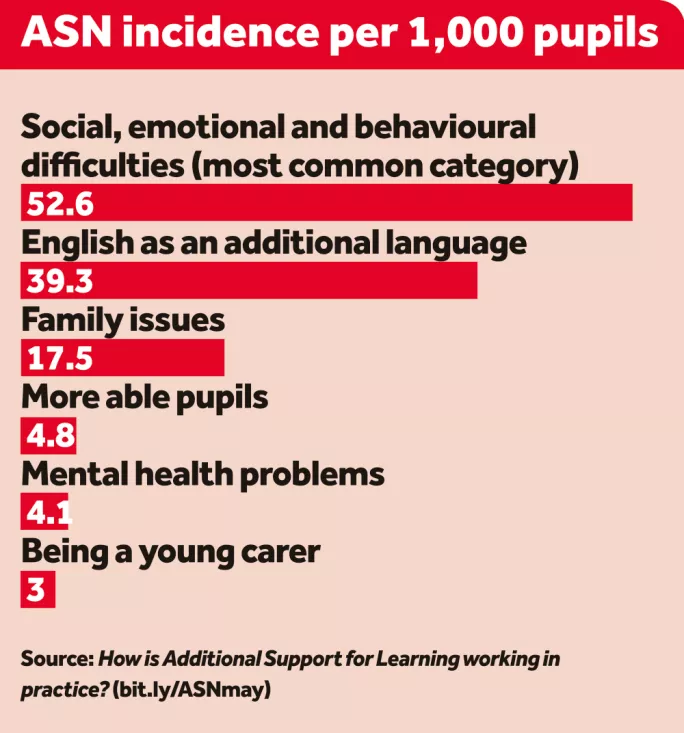Gaps in ASN provision lead to ‘traumatic’ experiences

Patchy support for Scotland’s ambitious inclusion agenda is leaving some of the country’s most vulnerable children “traumatised”, according to teachers and parents.
Tes Scotland has delved through the hundreds of pages of testimonies that poured into a Parliamentary inquiry on additional support needs (ASN) - mostly from parents and teachers.
The documents reveal repeated complaints that children are suffering because of regional variations in the “culture” relating to pupils with ASN.
Nearly a quarter - 24.9 per cent - of Scotland’s pupils were recorded as having ASN in 2016 - up from 4.2 per cent in 2003.
The increase follows changes in 2004 that saw the term expanded to embrace a wider range of issues, and led to a statutory presumption that most pupils will be taught in mainstream schools.
However, teachers and parents have complained of children going through “traumatic” and “horrendous” experiences at schools they say are ill-equipped to cope with their often highly complex needs.
The Scottish Parliament’s Education and Skills Committee, which is holding the inquiry, wrote in a report published this week that it was “concerned that additional support needs are going unrecognised in some education authorities more than others”, pointing to the “culture” in some areas and schools.
The contrasting situations across council boundaries are criticised in the submissions.

One parent of a boy with complex needs described watching him “deteriorate rapidly” after the family moved from a highly supportive learning environment in one authority to another area where staff had “non-existent training” - an experience they say left the boy with post-traumatic stress disorder.
In contrast, another parent said targeted support from the first day of P1 helped her son reach the “top of the class” by P5.
A teacher wrote of one autistic child, and another with Down’s syndrome, being left on the sidelines as staff focused on children deemed capable of passing assessments.
The varying approaches to ASN are also suggested in the number of children with ASN that councils have recorded. In written evidence, inclusion expert Professor Sheila Riddell, contrasts Aberdeenshire, a rural authority where 35 per cent of children are classed as having ASN, and North Lanarkshire, one of Scotland’s poorest authorities, where the figure is only 6 per cent. “We have to ask…what is going on there,” she wrote.
The education committee said it wants the government to investigate “inexplicably low percentages of ASN”, and suggests these might be partly explained by “cultural resistance to adopting the [national] mainstreaming policy or a lack of emphasis on children with ASN”, at school and council level.
It has also called for a commission to broker a national agreement on the role of classroom support staff, whose duties can currently differ widely around Scotland.
The charity Kindred, which supports more than 1,000 families with disabilities each year, suggested in its evidence that some local authorities wrongly interpret the presumption to mainstream as meaning that even pupils with particularly complex needs should start in a mainstream school. If such a pupil is unable to cope, the charity warned, finding a specialist place can take months or even years.
Enable, Scotland’s largest voluntary organisation, pointed out that, despite tight budgets, not all areas are cutting specialist professionals: only 22 out of 32 local authorities had reduced ASN teachers since 2009.
A Scottish government spokeswoman said: “The Education (Additional Support for Learning) (Scotland) Act 2004 places duties on education authorities to identify, provide for and review the additional support needs of their pupils. Children and young people should learn in the environment which best suits their needs, whether that is in a mainstream or special school setting.”
She added: “The government will continue to work with local authorities to ensure we build on our success to date. The Scottish approach to inclusion is already world-leading; our legislative and policy commitments are among the most enlightened in the world.”
You need a Tes subscription to read this article
Subscribe now to read this article and get other subscriber-only content:
- Unlimited access to all Tes magazine content
- Exclusive subscriber-only stories
- Award-winning email newsletters
Already a subscriber? Log in
You need a subscription to read this article
Subscribe now to read this article and get other subscriber-only content, including:
- Unlimited access to all Tes magazine content
- Exclusive subscriber-only stories
- Award-winning email newsletters